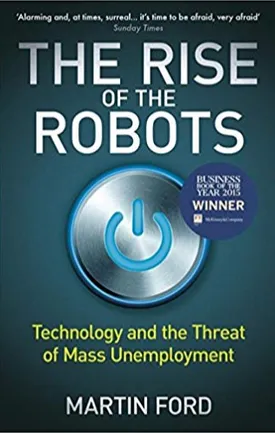The Rise of the Robots: Technology and the Threat of Mass Unemployment by Martin Ford
In his groundbreaking book The Rise of the Robots: Technology and the Threat of Mass Unemployment, author Martin Ford paints a worrying vision of our future. He warns that tremendous advances in automation and artificial intelligence have the potential to devastate our economy—bringing about mass unemployment and drastic changes in the way modern societies function.
Ford begins his book by laying out a grim forecast—automation is already beginning to take jobs away from people, and it’s only going to get worse in the years to come. He goes on to detail the reasons why this could happen, starting with technology’s current capabilities and then expanding outwards, showing how we could arrive at a future in which nearly all jobs are taken over by machines, leaving humans behind. Furthermore, Ford describes the consequences such a dystopia poses—entire sectors of the economy could be destroyed, vast swaths of the population could become unemployed, and it could lead to a drastic disruption of our current capitalist system.
Ford further argues that while the emerging technologies of artificial intelligence, robotics, and automation could bring immense benefits, they could also result in the displacement of millions of people, as machines take over jobs that humans had previously done. This, he suggests, could bring mass unemployment, leading to great economic turmoil, as well as increases in social inequality and rampant deflation. He gives numerous examples of how this has already begun to happen, citing trends such as the decline of manufacturing jobs in America and the shift to low-cost labor in overseas countries.
However, Ford stresses that the future doesn’t have to be a dystopian one—there are ways to avoid the worst outcomes. He discusses the need for investment in education, retraining, and the establishment of policies that will ensure people can remain employed even in an economy populated by robots. He also cautions against the use of technology as a “quick-fix” to economic issues and suggests that any attempt to employ automation must be done in an ethical and responsible way, with technology and labor coexisting in harmony.
Overall, Ford’s book is both sobering and thought-provoking, calling on readers to consider the potential effects of automation on our society and economy. Although the risks posed by these developments may be daunting, the author encourages us to remain optimistic, suggesting ways to negotiate the challenges in order to create a better future for everyone.

